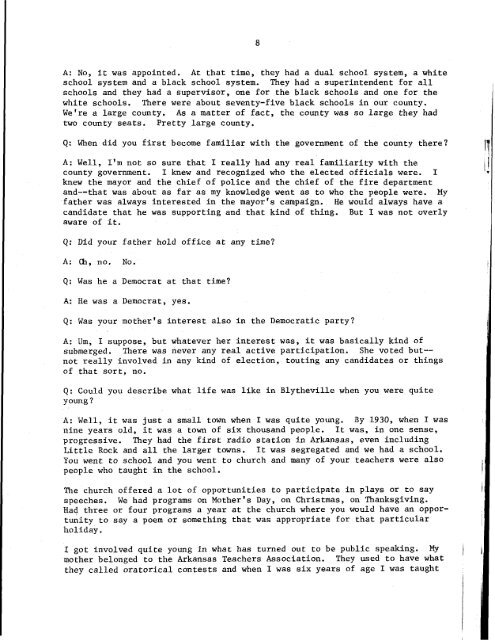Cecil A. Partee Memoir - University of Illinois Springfield
Cecil A. Partee Memoir - University of Illinois Springfield
Cecil A. Partee Memoir - University of Illinois Springfield
You also want an ePaper? Increase the reach of your titles
YUMPU automatically turns print PDFs into web optimized ePapers that Google loves.
A: No, it was appointed. At that time, they had a dual school system, a white<br />
school system and a black school system. They had a superintendent for all<br />
schools and they had a supervisor, one for the black schools and one for the<br />
white schools. There were about seventy-five black schools in our county.<br />
We're a large county. As a matter <strong>of</strong> fact, the county was so large they had<br />
two county seats. Pretty large county.<br />
Q: When did you first become familiar with the government <strong>of</strong> the county there?<br />
A: Well, I'm not so sure that I really had any real familiarity with the<br />
county government. I knew and recognized who the elected <strong>of</strong>ficials were. I<br />
knew the mayor and the chief <strong>of</strong> police and the chief <strong>of</strong> the fire department<br />
and--that was about as far as my knowledge went as to who the people were. My<br />
father was always interested in the mayor's campaign. He would always have a<br />
candidate that he was supporting and that kind <strong>of</strong> thing. But 1 was not overly<br />
aware <strong>of</strong> it.<br />
Q: Did your father hold <strong>of</strong>fice at any time?<br />
A: Q1, no. No.<br />
Q: Was he a Democrat at that time?<br />
A: He was a Democrat, yes.<br />
Q: Was your mother's interest also in the Democratic party?<br />
A: Urn, I suppose, but whatever her interest was, it was basically kind <strong>of</strong><br />
submerged. There was never any real active participation. She voted but--<br />
not really involved in any kind <strong>of</strong> election, touting any candidates or things<br />
<strong>of</strong> that sort, no.<br />
Q: Could you describe what life was like in Blytheville when you were quite<br />
young ?<br />
A: Well, it was just a small town when I was quite young. By 1930, when I was<br />
nine years old, it was a town <strong>of</strong> six thousand people. It was, in one sense,<br />
progressive. They had the first radio station in Arkansas, even including<br />
Little Rock and all the larger towns. It was segregated and we had a school,<br />
You went to school and you went to church and many <strong>of</strong> your teachers were also<br />
people who taught in the school.<br />
The church <strong>of</strong>fered a lot <strong>of</strong> opportunities to participate in plays or to say<br />
speeches. We had programs on Mother's Day, on Christmas, on Thanksgiving.<br />
Had three or four programs a year at the church where you would have an opportunity<br />
to say a poem or something that was appropriate for that particular<br />
holiday.<br />
I got involved quite young in what has turned out to be public speaking. My<br />
mother belonged to the Arkansas Teachers Association. They used to have what<br />
they called oratorical contests and when I was six years <strong>of</strong> age I was taught
















